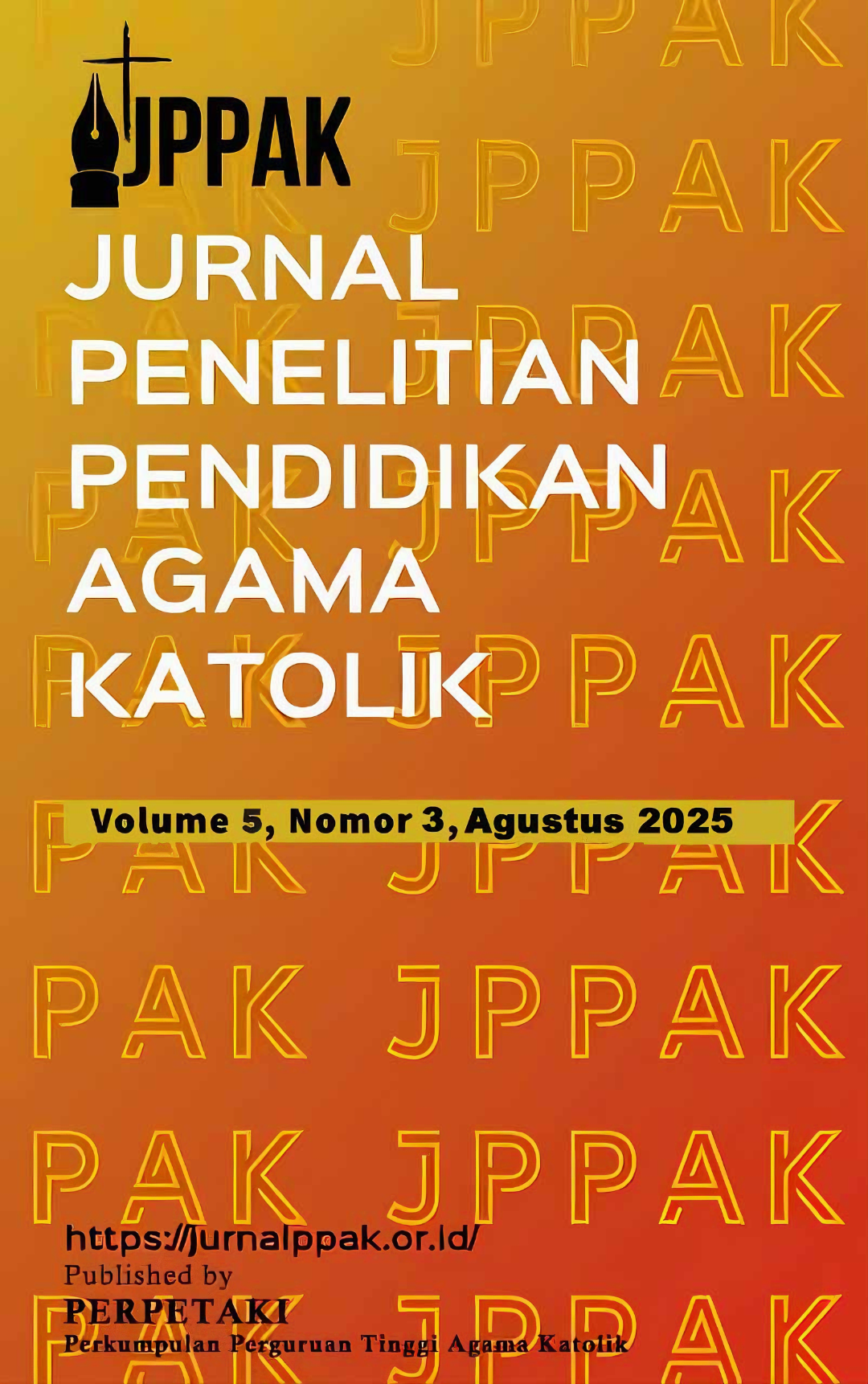Pemahaman Umat tentang Makna Persembahan dan Korelasinya dengan Ketidakhadiran pada Misa Hari Minggu (Studi Kasus di Stasi St. Maria Imakulata Oeltua, Paroki St. Yosef Pekerja Penfui)
DOI:
https://doi.org/10.52110/jppak.v5i3.212Keywords:
Understanding; meaning of the offering; absence; Stasi St. Maria Imakulata Oeltua; Sunday MassAbstract
This study aims to explore and explain the understanding of Catholics at Stasi St. Maria Imakulata Oeltua, Parish of St. Josef Pekerja Penfui, regarding the meaning of the offering and its correlation with their absence from Sunday Mass. This study is a qualitative study that uses a literature approach. The results of this study show that a number of Catholics at Stasi St. Maria Imakulata Oeltua have a wrong understanding about the meaning of the offering. According to them, offering is not only as a form of gratitude to God, but also a condition to get God’s blessing. That point of view has to do with their absence in the Eucharist on Sunday. They will not attend the Eucharist on Sunday when they do not have money to give to the Church as a form of their offering. The Eucharist is actually the source and peak of the faith of Christians. The main and first offering in the Eucharistic Celebration is the self and the heart of the Christians themselves. In other words, the main and most important offering of Christians is the offering of self or the offering of whole life; and not money. Money is needed to sustain the life and ministry of the Church, but it is not the main thing of the Christians offering. Therefore, to correct this misunderstanding, catechesis needs to be held as a means of teaching the true Catholic faith.
Downloads
##submission.downloads##
Submitted
Accepted
Published
How to Cite
Issue
Section
License
Copyright (c) 2025 Eugenius Koresy Bour, Yoseph Freinademetz Runesi

This work is licensed under a Creative Commons Attribution-ShareAlike 4.0 International License.
Copyright Notice and Permissions
Jurnal Penelitian Pendidikan Agama Katolik offers immediate open access to all its content on the principle to make researches freely available to the public, especially to the scholars, to support greater global exchanges of knowledge. This journal encourages all scholarly authors to allow their research openly available, free access and without time restrictions.
All articles published Open Access will be immediately and permanently free for everyone to read and download. Under the CC BY-SA 4.0 license, authors retain ownership of the copyright for their article, however authors grant others permission to use the content of publications in Jurnal Penelitian Pendidikan Agama Katolik (JPPAK) in whole or in part provided that the original work is properly cited. Users (redistributors) of Jurnal Penelitian Pendidikan Agama Katolik (JPPAK) are required to cite the original source by including at least: the full title of the article, the author's or authors' full name(s), JPPAK as the initial source of publication, year of publication and volume number using a propriate citing method.
Copyright encompasses exclusive rights to reproduce and deliver the article in all form and media, including reprints, photographs, microfilms and any other similar reproductions, as well as translations. The reproduction of any part of this journal, its storage in databases and its transmission by any form or media, such as electronic, electrostatic and mechanical copies, photocopies, recordings, magnetic media is prohibited without consent of Jurnal Penelitian Pendidikan Agama Katolik (JPPAK).
Jurnal Penelitian Pendidikan Agama Katolik (JPPAK) is licensed under a Creative Commons Attribution Share-Alike 4.0 International. (CC BY-SA 4.0)
Authors who publish with Jurnal Penelitian Pendidikan Agama Katolik (JPPAK) agree to the following terms:
- Authors retain copyright and grant the journal right of first publication with the work simultaneously licensed under a Creative Commons Attribution Share-Alike 4.0 International (CC BY-SA 4.0) license that allows others to share the work with an acknowledgement of the work's authorship and initial publication in this journal.
- Authors are able to enter into separate, additional contractual arrangements for the non-exclusive distribution of the journal's published version of the work (e.g., post it to an institutional repository or publish it in a book), with an acknowledgement of its initial publication in this journal.
- Authors are permitted and encouraged to post their work online (e.g., in institutional repositories or on their website) after the publication on JPPAK, as long as it not published on other OJS for it will be treated as plagiarism by plagiarism checker apps. It can lead to productive exchanges, as well as earlier and greater citation of published work (See The Effect of Open Access).












